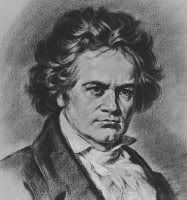
Diane Kruger plays Anna Holz, a calm character who is a counterpoint to Beethoven, in several ways. She is not an actual person although someone like her certainly could have been from what I know of his life. Some famous works are there, principally the 9th Symphony, though the orchestra and chorus aren't quite up to the emotional weight they are given. The story of the Grosse Fugue is retold wonderfully, and I loved the way the film showed him as a feeling person as well as a brute because I'm really really sick of the brute and crazy schtick about him. The director, Agnieszka Holland, has a great reputation for artistic, genteel, pretty movies and this is no exception.
My main objection to the movie is that it spends too much time showing the wild man and too little showing the musical splendor. Leonard Bernstein famously wrote that "Beethoven broke all the rules, and turned out pieces of breath-taking rightness [where] you get the feeling that whatever note succeeds the last is the only possible note that can rightly happen at that instant, in that context" adding that he had "the power to make you feel . . . [s]omething is right in the world . . . ." The magnificent power, the thundering, stunning, earth-shaking beauty all seem to demand a bit that we take them on faith. (A faith that the film fairly inexplicably requires us to take with little to back it up, considering that Beethoven never wrote a requiem and rarely wrote religious music.) And although I appreciated the characters' discussion/argument of musical movements without detectable ends and beginnings, it have been nice to learn vividly why and how his work broke traditions and cleared the way for new sounds and forms.
Unfortunately, the movie just seems too light-weight in ways I can't entirely or totally identify. There's something missing or perhaps it's too television-y, although it is worth seeing and hearing since no movie has to be all things at all times. I think Copying Beethoven would seem serious and intellectual if broadcast on Lifetime but it seems romantic and inconsequential on its own.
Labels: movies, reflections

 jau — at 9:13 AM, July 20, 2007:
jau — at 9:13 AM, July 20, 2007:
But what do you really think?
< home >
< home


OK, I feel better now!
< home >